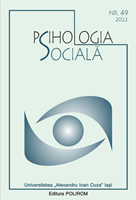Triangularea în cercetarea socială
Triangulation in social research
Author(s): Mihai CurelaruSubject(s): Social psychology and group interaction, Methodology and research technology, Social Theory
Published by: EDITURA POLIROM S.A.
Keywords: triangulation: research methods: social research: validity: mixed methods;
Summary/Abstract: In order to gain a more complex and deeper understanding of the psychological and social phenomena that may be the subject of research, it is advisable to develop a complex theoretical background, to use several methods and to combine different types of research (qualitative and quantitative). It is also advisable to collect data from several sources and to set up multidisciplinary teams within the same scientific program. All these are now made possible by the development in the social sciences, since the 1970s and 1980s, of two new approaches to research: triangulation and mixed methods, respectively. Although they have many aspects in common, which sometimes may cause confusion, triangulation and mixed methods are conceptually different (Creswell, 2018; Denzin, 2012) and also have different development histories. The present study deals with one of the two perspectives, namely triangulation. First, the origin of this concept and its early theorizing are presented. Then, the evolution of triangulation and its main criticisms over time are discussed. The final section of the article deals with the relationship between triangulation and mixed methods and its possible evolution.
Journal: Psihologia socială
- Issue Year: 1/2022
- Issue No: 49
- Page Range: 43-59
- Page Count: 17
- Language: Romanian
- Content File-PDF

